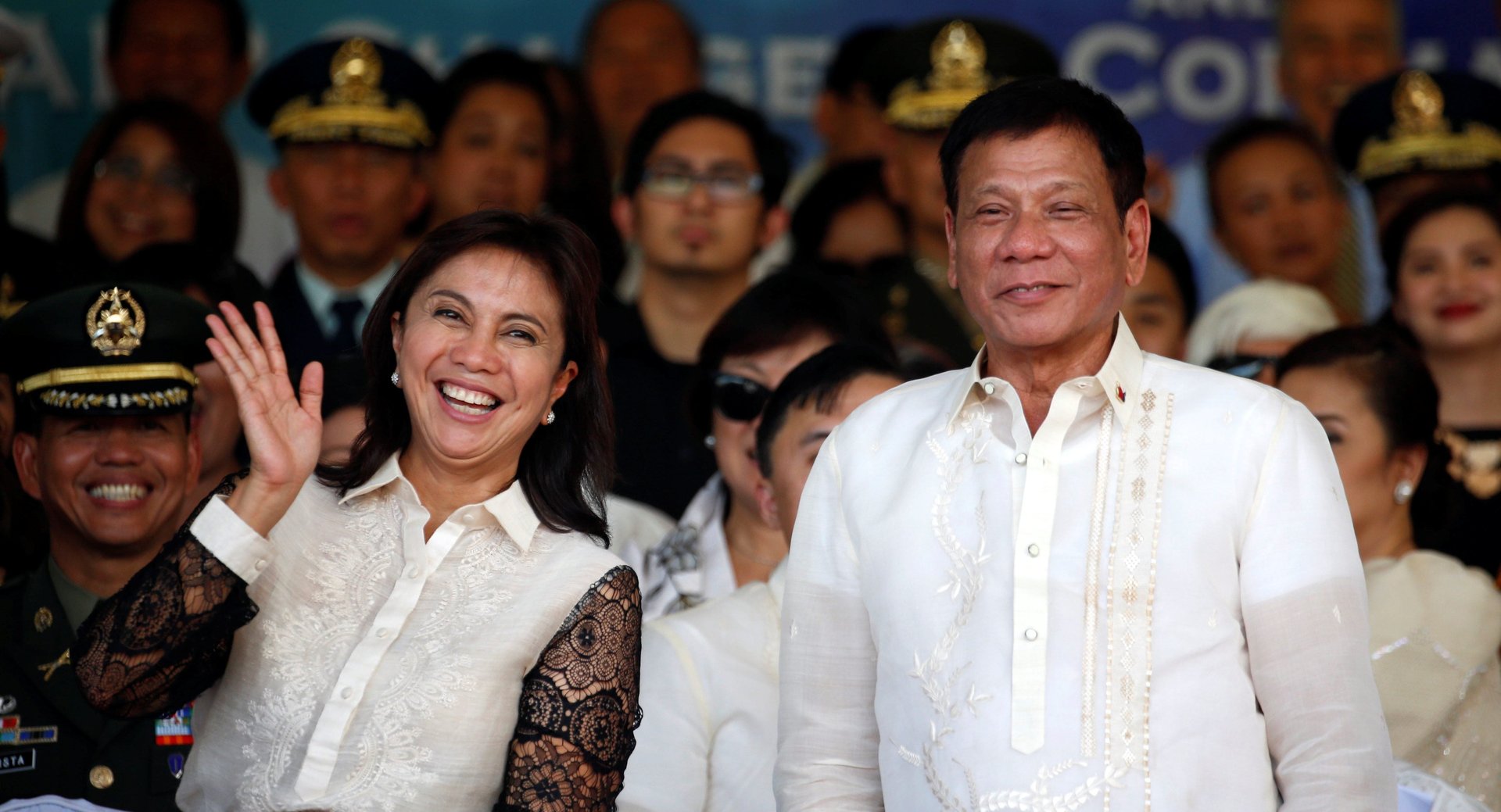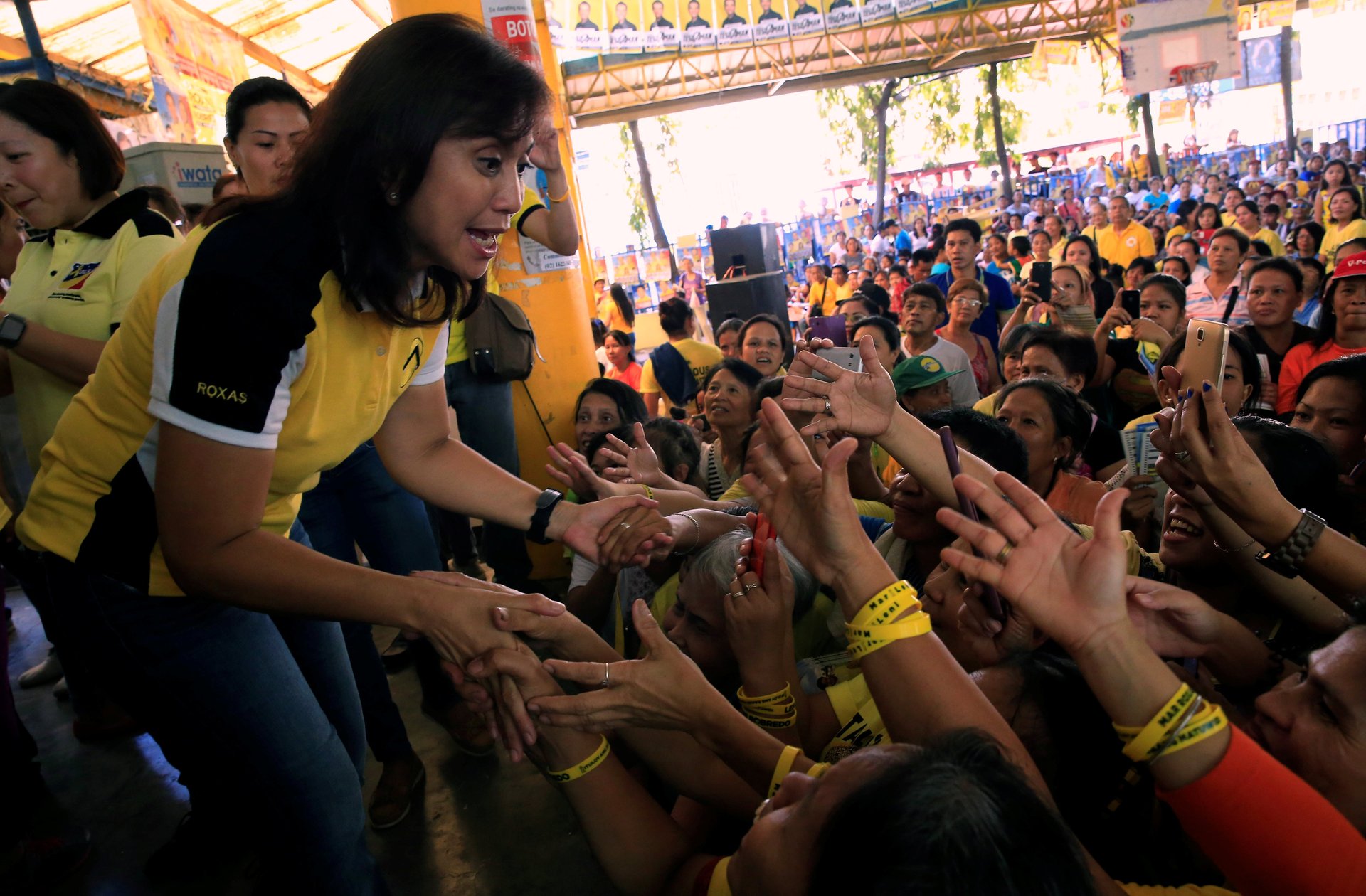The woman who could take down Rodrigo Duterte: his soft-spoken, even-tempered vice president
For all the controversy he’s generated since taking office a little over five months ago, Philippines president Rodrigo Duterte has—so far—remained a popular leader among Filipinos. That makes challenging him difficult, but the political opposition is gathering strength, led by a charismatic but fundamentally different kind of politician: his vice president, Leni Robredo.


For all the controversy he’s generated since taking office a little over five months ago, Philippines president Rodrigo Duterte has—so far—remained a popular leader among Filipinos. That makes challenging him difficult, but the political opposition is gathering strength, led by a charismatic but fundamentally different kind of politician: his vice president, Leni Robredo.
In the Philippines, the president and vice president are often from rival parties, as has been the case in four of the last five administrations. Robredo ran for vice president as the running mate of presidential contender Mar Roxas. Roxas lost, but Robredo won the vice presidency, narrowly beating Ferdinand “Bongbong” Marcos Jr., the son of the late Philippine dictator Ferdinand Marcos and Duterte’s preferred choice. She also became the housing secretary, and thus part of Duterte’s cabinet.
The latter arrangement came to an end this week. After Duterte barred her from his cabinet meetings—making it impossible for Robredo to do her job, she argued—Robredo resigned as housing secretary.

But she has kept her position as vice president (ignoring warnings of a plot to steal it), become the face of the Liberal Party, and grown increasingly vocal in her opposition to Duterte’s policies.
She spoke out against the administration’s plan to reinstate the death penalty, for instance. And she added her voice to the thousands who protested against Duterte’s decision to give Ferdinand Marcos a hero’s burial, despite widespread opposition to the idea. She also criticized Duterte’s war on drugs for going outside the law and not focusing enough on rehabilitation.
Melito Salazar, the former undersecretary of trade, was unsurprised by Robredo’s resignation and her increasingly aggressive stance against Duterte. He sees it as a positive development for the country.
“I expected it given president Duterte’s obvious preference for Bongbong Marcos,” Salazar said. “Hopefully these developments will temper Duterte’s sometimes impetuous decisions.”
Robredo serves as an alternative to Duterte in other ways, as well, including temperament. While Duterte is tough-talking and coarse, Robredo is soft-spoken and well-mannered. While Duterte encourages the merciless killing of suspected drug criminals—often without a trial—Robredo calls for rehabilitation.
More strikingly, Duterte is unapologetically political, whereas Robredo is decidedly not. She is first and foremost a mother to her three daughters and the widow of Jesse Robredo, the former interior secretary who died in a plane crash in 2012. It took months of urging from her party before she agreed to run for vice president.

Her story echoes that of Cory Aquino, who became the Philippine president in 1986 after supporters appealed to her to run in place of her slain husband, the martyred Benigno “Ninoy” Aquino.
Of course, unlike Aquino, Robredo is only vice president—and she’s up against a blatantly sexist president.
While addressing the victims of 2013’s Typhoon Haiyan (called Typhoon Yolanda in the Philippines) last month, Duterte teased Robredo by insinuating they could make a good couple. There’d be no problem with this, he said, since she’s a widow and he’s annulled from his wife. Duterte then proceeded to comment on the vice president’s skirt:
“Ma’am Leni wore a dress that was shorter than usual. The protocol officers probably noticed I was always behind her. I told [finance secretary] Sonny Dominguez, ‘You’re too far, come closer. Check out her knees…’ When Robredo noticed [she tried to cover her legs]. I wanted to tell her, “Ma’am why don’t you just wear shorts instead?'”
Robredo remained diplomatic, saying she would rather focus her attention on more urgent issues. But she did comment, “Tasteless remarks and inappropriate advances against women should have no place in our society. We should expect that most of all from our leaders.”
She now looks set to persuade many Filipinos to expect more in their president.